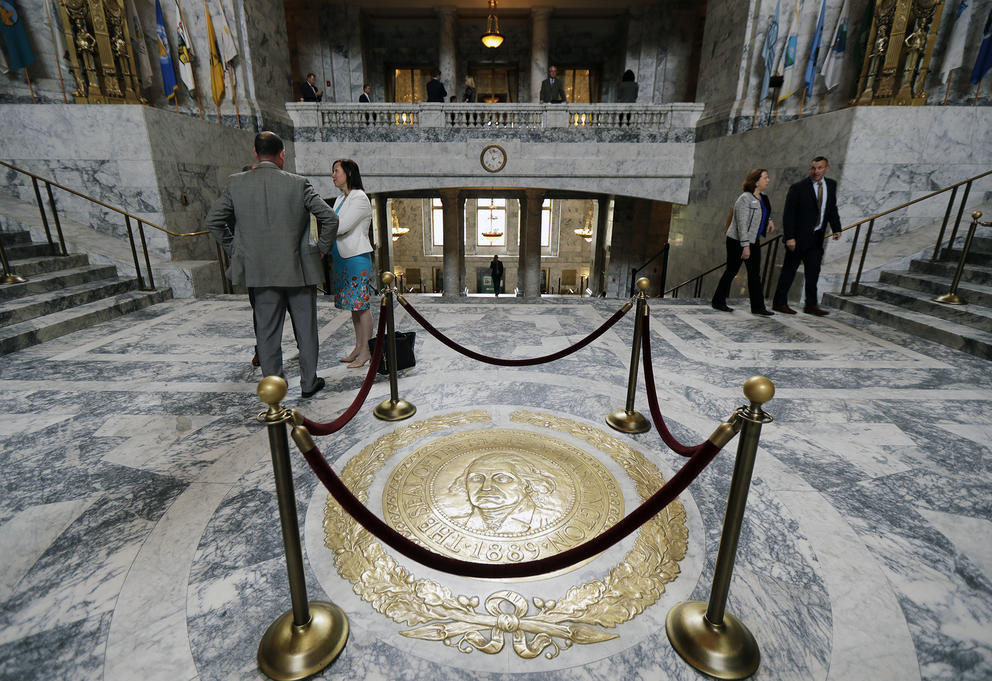Lawmakers considered and passed many policy bills addressing a wide variety of issues from homelessness to behavioral health. But proposals covering some of their top priorities, including housing, did not capture the required votes.
Although the House passed a housing density bill on the first day of the session, in the end most of their housing proposals didn’t make it to the governor’s desk, including House Bill 1245, which would have made it easier for larger residential lots to be split into properties as small as 2,000 square feet. Also failing to pass was a proposal to create a new state housing agency, as well as several rent stability bills, including House Bill 2114 which would cap rent increases at 7%.
Housing advocates seemed especially disappointed in the demise of House Bill 2276, a bill to expand housing supply, which passed out of a House committee then stalled. The proposal would have created a permanent income source for the Housing Trust Fund and for affordable housing for people with disabilities.
“Like the rent stabilization measure, this policy would be a game changer, providing sustainable funding to address the affordable housing gap that all of our communities face,” Michele Thomas, advocacy and policy director for the Washington Low Income Housing Alliance, wrote in a statement.
Rep. April Berg, D-Mill Creek, chair of the House Finance Committee and prime sponsor of HB 2276, joined her lament, drawing a stark contrast between 2023’s “year of housing” and this legislative session.
“Every single community across Washington state is facing a lack of affordable housing and the crisis of increasing homelessness. While we’ve laid the foundation for success through state budget investments in housing, we know we need to do much more to address this ever-growing crisis,” Berg said in a statement. “The disappointment at our lack of progress on housing this session is palpable.”
Housing policy did have some bright moments this session, including the passage of House Bill 1998, which will require cities and counties to allow “co-living housing” or boarding houses and multifamily living within one home in urban growth areas. The bill limits restrictions on people renting a room in a home and sharing bathroom and kitchen facilities. It’s an affordable option that currently faces barriers like local land-use codes.
While most of the proposals aimed at making housing more plentiful or affordable died in the Legislature this year, another top priority of Democratic lawmakers saw some success: gun legislation. The Legislature passed House Bill 1903, which requires gun owners to report stolen guns to law enforcement within 24 hours or face a potential fine of up to $1,000. House Bill 2118 on gun-dealer security measures also passed, requiring gun dealers to have surveillance cameras, even if they are selling weapons out of their homes.
Lawmakers made some progress in passing environmental legislation, but some of Gov Jay Inslee’s top priorities didn’t make it, including a bill to establish a new state agency to watchdog the state’s oil industry. Lawmakers did approve a plan to change the new cap-and-invest system as a first step toward joining California and Quebec in a larger market. The Legislature also set aside $50 million for electric school buses and $150 million for utility customer rebates – both from the income from Washington’s new cap-and-invest carbon pricing system.
Three of six citizen-led initiatives proposed to the Legislature were also approved, to loosen police pursuit restrictions, establish a kind of parents’ bill of rights and to forbid a state income tax. Although lawmakers testified during debate that provisions protecting parents’ rights are already in state statute, the initiative was approved anyway. And the Legislature cannot pass an income tax; it would require a Constitutional amendment, and numerous previous attempts have failed. The police pursuit measure does undo some previous legislative work to limit police chases.
That leaves three tax measures for voters to decide on the November ballot. Conservative organization Let’s Go Washington, funded by Redmond hedge fund manager Brian Heywood, wants voters to repeal the Climate Commitment Act, which created Washington’s new cap-and-invest system of carbon auctions. The same group has proposed a repeal of Washington’s capital gains tax, and the third initiative would weaken the state’s long-term care insurance payroll tax.
And there were some surprising advancements in education policy and funding that have been discussed in Olympia for years, including a boost in the school construction formula to add $103 per square foot for school-building, and support for a statewide pilot project to increase the amount of time students with disabilities spend in general-education classrooms. But lawmakers did not advance a proposal to change the vote needed to pass a school construction bond to a simple majority.
Adjustments made to state budgets during the 2024 session included more money for ferries; funds to combat substance-use disorder; millions more for special education; an increase in state child care reimbursements; food assistance for kids and seniors; and $4 million for the state to pay the entire cost of training new law enforcement officers. Lawmakers also made decisions about how to spend the money being raised in cap-and-invest auctions.
Updates on other bills we covered
A bill to address barriers to work for undocumented Washingtonians has passed out of both houses, and will now head to Gov. Inslee’s desk. House Bill 1889 will remove citizenship requirements for all professional licensing applications, which proponents say will create much-needed clarity for people seeking these licenses.
Washington is one step closer to requiring that the life-saving opioid-overdose reversal medication Narcan be available in all public, charter and state-tribal education compact schools, as Senate Bill 5804 has passed out of both houses. The bill will now be delivered to the governor’s desk before becoming law.
A bill to extend unemployment benefits to striking workers fell short. House Bill 1893 would have increased unemployment benefit payouts by less than 1%, according to the state’s Employment Security Department. But opponents said it could increase business costs or prolong work stoppages. Sen. Karen Keiser, D-Des Moines, who chairs the Labor and Commerce Committee, speculated that lawmakers were not ready to tackle such a big new idea in a short session.
Lawmakers passed a bill to curb seizures of child support payments. In 2022, Washington took $41 million intended for parents of impoverished children, under a practice allowed by federal law. House Bill 1652 will change that in 2026 for Washington families receiving child support and state benefits such as Temporary Assistance for Needy Families. The effective date was delayed due to an amendment requested by the Department of Social and Health Services, which needed extra time to make computer upgrades.
Lawmakers came to a late-session agreement on Senate Bill 6194 to outline collective bargaining rights for legislative staffers just before adjourning Thursday. In 2022, the Legislature lifted the state’s prohibition on the unionization of legislative staffers, allowing them to begin organizing in May 2024.
From left; House Minority Leader Drew Stokesbary, R-Auburn; Senate Minority Leader John Braun, R-Centralia; Senate Majority Leader Andy Billig, D-Spokane; and Speaker of the House Laurie Jinkins, D-Tacoma, laugh after participating in a panel during a legislative session preview in the Cherberg Building at the Capitol Thursday, Jan. 4, 2024 in Olympia. (AP Photo/Lindsey Wasson)
A bill aimed at addressing police deception during interrogations failed to move through the Legislature. House Bill 1062 proposed making confessions obtained by officers who used deception inadmissible in court, with support from Amanda Knox and other wrongful-conviction activists. The bill never made it onto the House floor and subsequently died.
A bill aimed at addressing a new and rapidly growing form of sexual misconduct has passed out of both houses. House Bill 1999, sponsored by Rep. Tina Orwall, D-Des Moines, creates civil and criminal legal remedies for victims of sexually explicit deepfakes – pornographic content made using AI without the subject’s consent. The bill now heads to Gov. Inslee’s desk for signature before becoming law.
A bill to create civil remedies for survivors of stealthing, the nonconsensual removal of a sexually protective device like a condom, will soon become law. House Bill 1958, which has now passed out of both houses, will establish monetary damages of $5,000 for the offense, as well as the reimbursement of attorneys’ fees.
A staggering 78% of young adults become homeless after exiting inpatient mental health treatment. But Washington may soon create temporary supportive-housing options to address this issue, with House Bill 1929 passing out of both houses. The bill has been delivered to Gov. Inslee’s desk for his signature.
Senate Bill 5838 will create a task force to study artificial intelligence issues for the Legislature. The bill calls for the creation of a 42-person task force, to begin meeting this year, to come up with recommendations on how the Legislature and state government should address AI issues. Preliminary recommendations on future legislation and regulations would be due to the governor’s office and to the Legislature by Dec. 31, 2024 and Dec. 1, 2025, with a final report due July 1, 2026.
A bill to promote inclusive education curricula in Washington has passed both Houses in a largely bipartisan vote after a rigorous debate by lawmakers. Senate Bill 5462 would update learning standards to include education on the LGBTQ+ community, and also require school boards to adhere to a model policy in adopting inclusive curricula, highlighting historically marginalized groups.
Lawmakers passed Senate Bill 5824 to make it harder to shut down public libraries, after at least one attempt last year, when a group in Columbia County tried to dissolve a rural library district after it refused to remove LGBTQ+ books.
House Bill 1648, or the “TSWIFT Consumer Protection Act,” did not pass to give concertgoers some protection from deceptive ticket sales.
Significant bills we didn’t get to
A bill to put medical equipment in schools has passed unanimously out of both houses. Senate Bill 5790 requires public schools, charter schools and state-tribal education compact schools, beginning in the 2026-27 school year, to carry bleeding-control equipment like bandages and tourniquets, and at least one semi-automatic defibrillator. Proponents say having this equipment on hand will save lives in the event of a traumatic injury like a gunshot wound or a cardiac event on campus.
In a bold move to end child marriage in Washington, Rep. Monica Stonier, D-Vancouver, introduced House Bill 1455, which has now been delivered to Gov. Inslee’s desk for signature. Current Washington law allows 17-year-olds to marry with parental consent, with judicial approval needed for those younger than 17. The bill would remove these loopholes, voiding all marriages in which either party is under 18. Proponents argue this bill will protect children, who are often too young to access supportive and legal resources, from the violence, abuse and crime associated with child marriage.
The Legislature passed a “Strippers Bill of Rights” this session after failing to do so last year. Senate Bill 6105 establishes a number of new safety protocols for adult entertainment, including panic buttons, customer behavior rules and worker safety training. It also includes a warning that an establishment could lose its liquor license if it violates certain laws related to adult entertainers. The bill, awaiting the governor’s signature, also gives entertainers more rights concerning their pay and employment status.
A measure lowering minimal residential parking requirements for multifamily housing, Senate Bill 6015, could make it easier to build more housing in urban areas. This bill applies to housing near regular public transit, and relates to market-rate housing as well as to low-income, workforce housing and units for people with disabilities.
A bill to allow rising high school juniors to participate in Running Start has passed both houses with bipartisan support. The Running Start program offers high school students the opportunity to earn both high school and college credits by enrolling in courses at local colleges. However, it is currently limited to juniors and seniors. Under Senate Bill 5670, students who have completed 10th grade but have not yet begun 11th can enroll in the program during the summer before junior year. Proponents say expanding the program to these students will help them save money in college by allowing them to graduate early.
A bill to restrict the amount of lead in cookware has passed out of both houses. Lead is a heavy metal toxic to human health, with documented effects on the brain and nervous system. But even as officials warn the public of the dangers of lead exposure, many large retailers still sell contaminated cookware. House Bill 1551 will restrict the manufacturing, sale or distribution of cookware containing more than five parts per million of lead, with monetary penalties for violations. Pending Inslee’s signature, Washington could become the first state in the nation to ban lead in cookware.
A bill that would have made computer science competency a graduation requirement, Senate Bill 5849, has died. In a landscape where 92% of jobs require digital skills, prime sponsor Sen. Lisa Wellman, D-Mercer Island, said this requirement is necessary to ensure that students can compete in a digital economy. However, some had concerns about the technology and teacher training needed to make this requirement possible. Although the bill passed out of the Senate 46-3, it did not make it out of the House Appropriations committee by the fiscal cutoff date.
In an effort to “ditch the switch” in Washington, Sen Mike Padden, R-Spokane Valley, introduced Senate Bill 5795 to establish year-round observance of Pacific Standard Time. Although congressional approval is required to establish year-round Daylight Saving Time – something the Washington Legislature has already approved – year-round Pacific Standard Time can be established without federal input. According to a YouGov survey, 62% of Americans would prefer not to switch clocks twice a year, with mental health and sleep impact associated with the practice. However, the bill never made it to the floor calendar.









